Running an ecommerce business involves lots of moving parts. Aside from selling your products or services, you also need to be able to manage your sales platform, nail your marketing, manage your team, and track your business goals.
Want to make the process as automatic as possible? You’re going to want to try out these tools to make your ecommerce store seamless.
Ecommerce Tools and Apps You Should Be Using
Using apps and tools to help automate parts of your ecommerce business is very beneficial. Aside from allowing you to save time, money, and effort, these tools can help you focus on the bigger picture. It gives you the time and freedom to run and grow your business.
Ironically, finding tools that work for your business can be a time-consuming and daunting task. So we’ve curated a list of twelve ecommerce tools and apps that can help you seriously elevate your business in a few different areas.
Operational Apps & Tools
These tools will help you with the day-to-day running of your ecommerce store. It will also help you manage everything from listing your products to measuring how people are using your website, taking payments and making sure your customers know what you offer.
Shopify Mobile
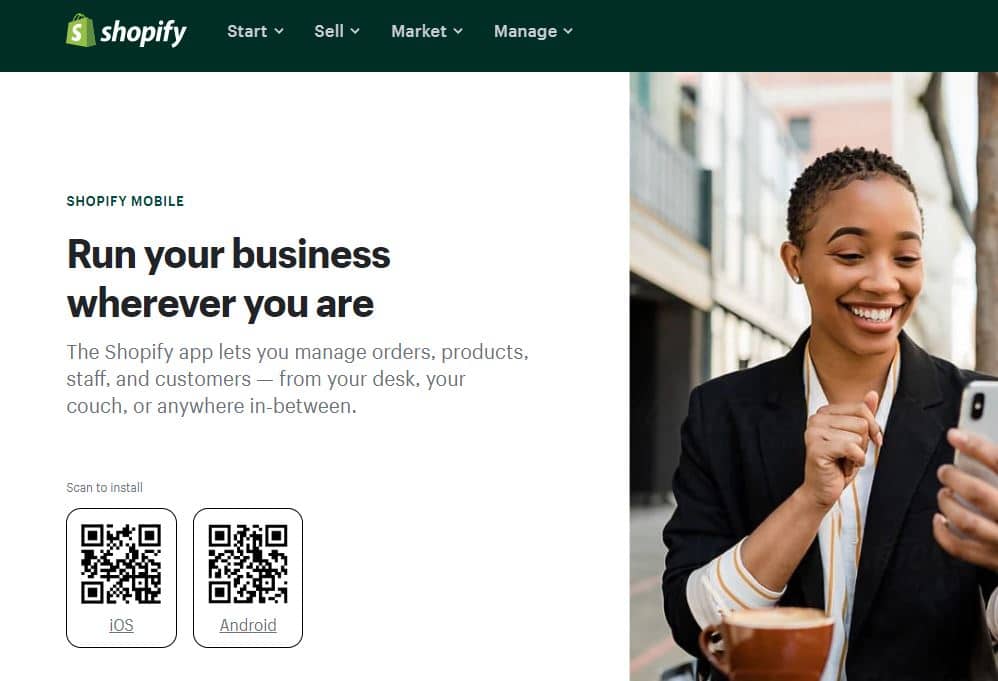
While there are other platforms to run your business, Shopify Mobile is one of the most straightforward. It helps you to reach customers and sell your products all in one place, whether that’s online, in-store or through social shopping. Everything is linked together and you can sync orders, products and customers using the app.
The app also makes it easy to keep an eye on everything while you’re on the go. You can manage sales, take payment, track inventory, list new products and get notifications about sales and reviews.
The Shopify mobile app also allows you to do stuff like responding to chargeback disputes directly in-app, reviewing all inventory changes made to products in the last 30 days, and more like fulfilling items by fulfillment services. If your website doesn’t use Shopify, look for an app for whatever platform your site runs through, such as WordPress.
Google Analytics
Being able to track how your customers are behaving and responding to your ecommerce business is a big deal. For everything from tracking pay-per-click (PPC) ads, to seeing which products have the most visitors and where the people visiting your site come from, your analytics can tell a story and help you make business decisions.
This can save you time and money by helping you work out what you should be doing to support your ecommerce website and storefront. Google Analytics is one of the most used analytics platforms out there, and it’s free to use.
Payments App
However you take payments for your products and services, it makes sense to have the payments app ready and waiting so that you can keep track and be notified of any issues, chargebacks or payment problems. It also makes it easier to check back if you need to and manage any payment disputes that might be happening on your site.
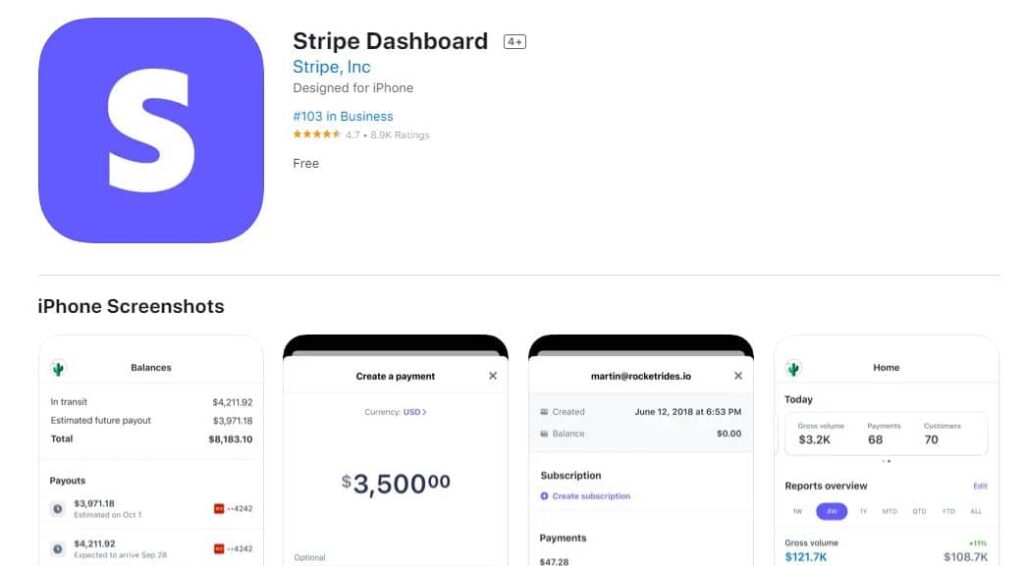
The one you use will vary depending on how you take payments. Some website platforms let you do this within the app and manage everything from there.
Back in Stock Notifier
Back In Stock Notifier automatically lets customers know when your products are restocked.
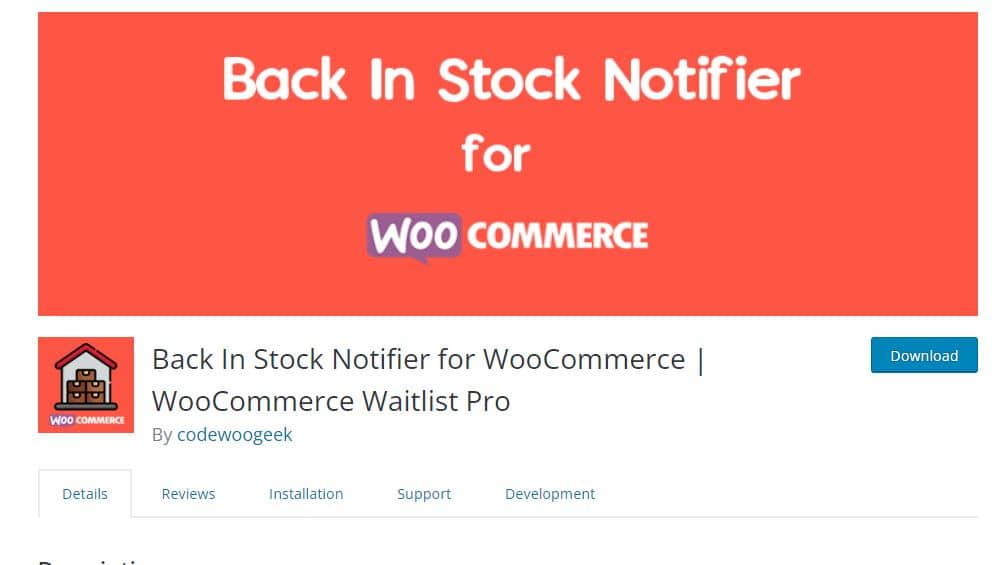
Suppose you’re out of stock or running low, and your customers want an update on when you’ll be restocking that product. In that case, a Back in Stock Notifier can automate that process for you and reduce the number of direct messages and emails you get about the same product. It’s also a great way to keep an eye on what you should restock, and where there’s demand for products that are running low.
It also means that you help your customers find their perfect product, by encouraging them to sign up for stock alerts, rather than just hoping that they remember to check back at a later date.
Pixc Photo Resizing App
Getting your images right is important in ecommerce. People buy based on what they see, so good-quality images that are the right size, shape, and aspect are hugely important when it comes to buying online. If you have a massive inventory, or your ecommerce platform needs images to be a certain size, it can start to be a pain.
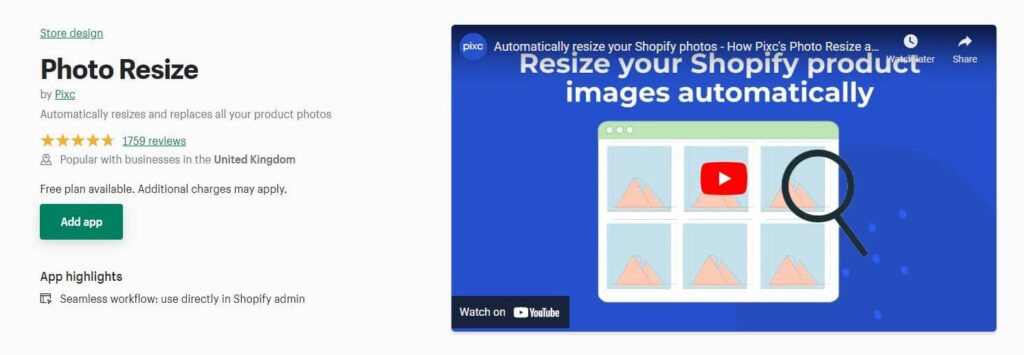
The Pixc Photo Resizing App makes resizing your images an absolute breeze. Just upload your images to your Pixc dashboard, select and customize a template that fits your store’s requirements and you’ll receive professionally edited photos within 24 hours. Publish them directly to your store. You can even remove backgrounds and add natural shadows using the app.
Marketing your Ecommerce Store
Marketing is a big part of running your ecommerce store and means that you can connect with your target audience to raise awareness of your products. When you’re starting out, marketing is one of the most important things you can do to generate interest in your business.
Here are some of the ecommerce tools that can help you to make light work of your marketing activity:
Social Media Apps
When it comes to marketing your business, most ecommerce businesses use social media to connect with potential customers and raise awareness of their products, services, and offers.
Whatever social media channels you’re using for your business, it makes sense to have the apps for each one. Whether you’re using Facebook, Instagram, TikTok, Linkedin or YouTube to market your business and connect with other professionals, having the app on your phone makes it easier to scroll and post in real-time.
You’ll also get analytics that you can use to work out what’s working best for your business when it comes to social media. That means you can concentrate on the channels that bring clients to you.
Hootsuite
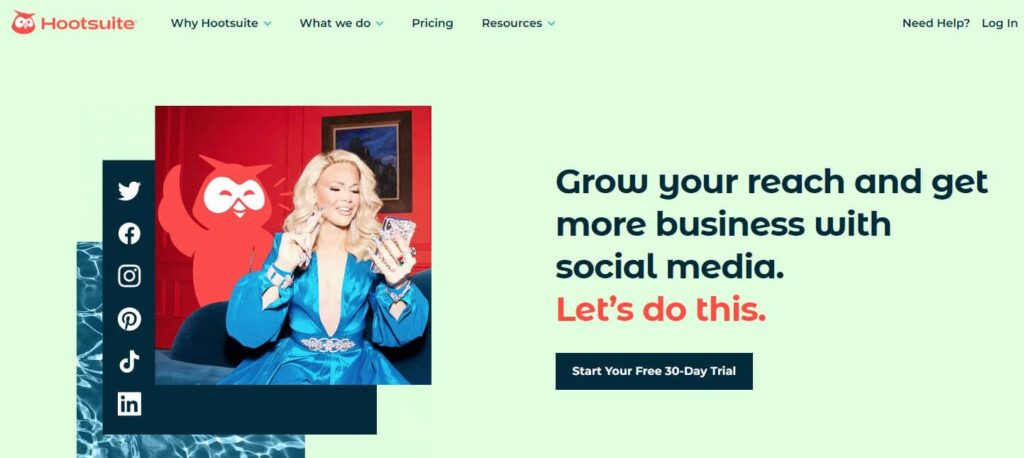
If you want to manage and maintain everything on your social media platforms in one place, then a service like Hootsuite or Later is necessary. You can see everything that’s going on across your social media channels, schedule content and respond directly to inquiries, comments and messages.
This can save you time and effort without skipping between different apps and manually posting across your social media channels. You’ll also get stats and analytics to help you assess what’s working and measure KPIs.
Klaviyo
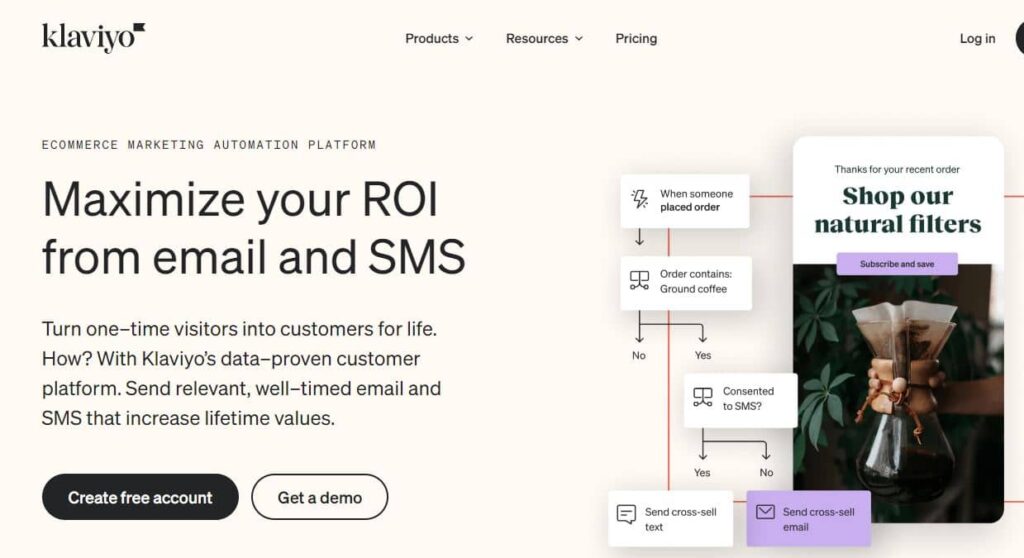
Klaviyo is an email and SMS marketing platform that allows you to connect with your customers (and potential customers) by sending out personalized, professional marketing messages to them. This could be special offers, news about your ecommerce store, or product launches. What goes in the message is totally up to you, and it’s straightforward to set up.
With a service like Klaviyo, it’s easy to build emails that look great and showcase your brand. You can also set it up to send out reminders when shopping carts are abandoned, or discounts for customers who haven’t ordered for a while. Plus, you can manage all your client contacts in one place – and get analytics and reports to help you gain insights into how people engage with your store.
There are other alternatives that do a similar service for your ecommerce business, like Mailchimp, so it makes sense to do your research and work out which one is going to be right for you.
Canva
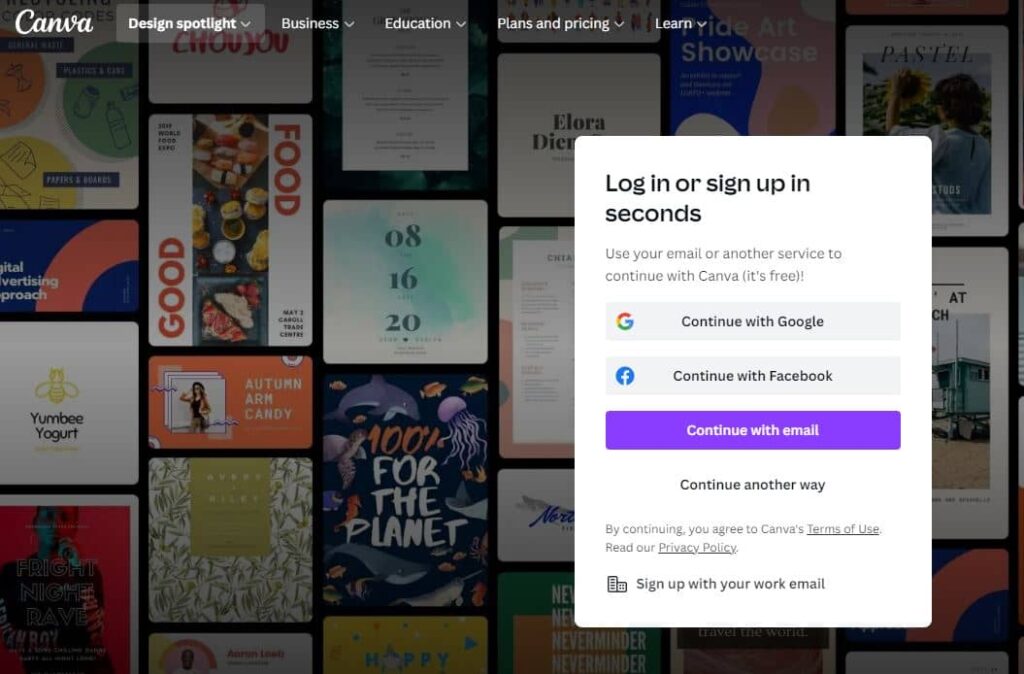
Canva is one of the ecommerce tools that has really revolutionized digital design, especially for people who aren’t design professionals. It’s filled with templates for pretty much everything, along with a bank of images and the ability to customize. You can even design your logo and get up to speed with your brand design.
It’s perfect for everything from social media right through to business cards and posters. It’s also really easy to use, and there’s a free version (with fewer features) available too. You can change designs as much as you need to as well as adjust them for different platforms.
InShot
InShot is an editing app for videos and photos. People are watching more video content than ever and as aesthetics is such a visual industry, it should definitely be part of your marketing strategy. You can make basic videos and even do some more advanced video editing, like video collages, slow motion, stop motion, reverse videos, and more. You can share and edit for various social media channels too – no more trying to crop and work out what the right size is.
Because phones and tablets are now able to take great photos and videos, InShot makes creating videos for social media much easier and you can use it straight from your phone, so even if you’re on the go or busy in clinics you can still create beautiful images and videos.
Loox
Customer reviews can be seriously influential when it comes to helping new buyers to make a decision on whether to make a purchase from your store. Especially if your product is a visual one and you let your buyers share photo reviews.
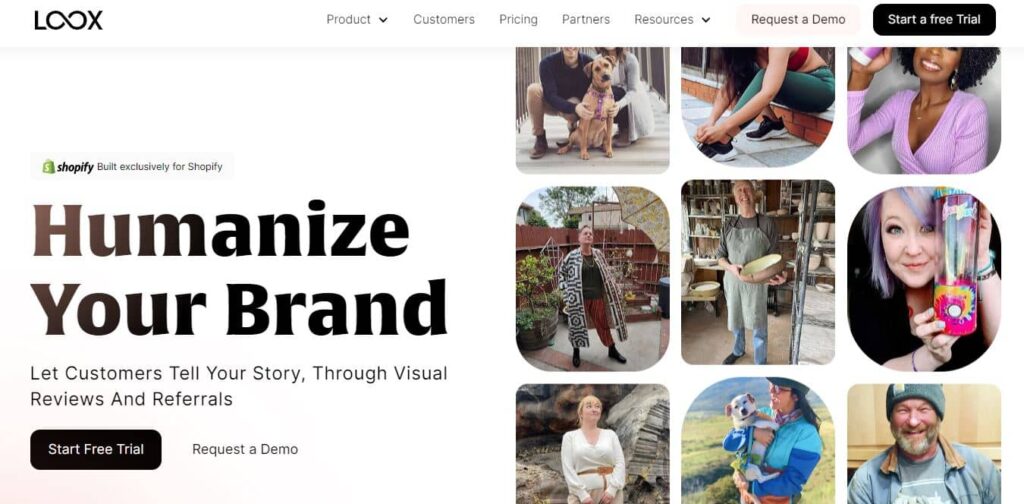
Step forward Loox, the leading reviews and referrals app that’s helped over 100,000 merchants boost their social proof, increase conversions and grow their customer base. It automates the process of requesting and adding reviews to the site, so you don’t need to do anything extra.
Klear
Influencer marketing is big news for ecommerce. Global brands have been built by working with social media influencers and celebrities to raise awareness of a product among their followers. But how do you find the right influencers for your ecommerce brand, and how do you work with them?
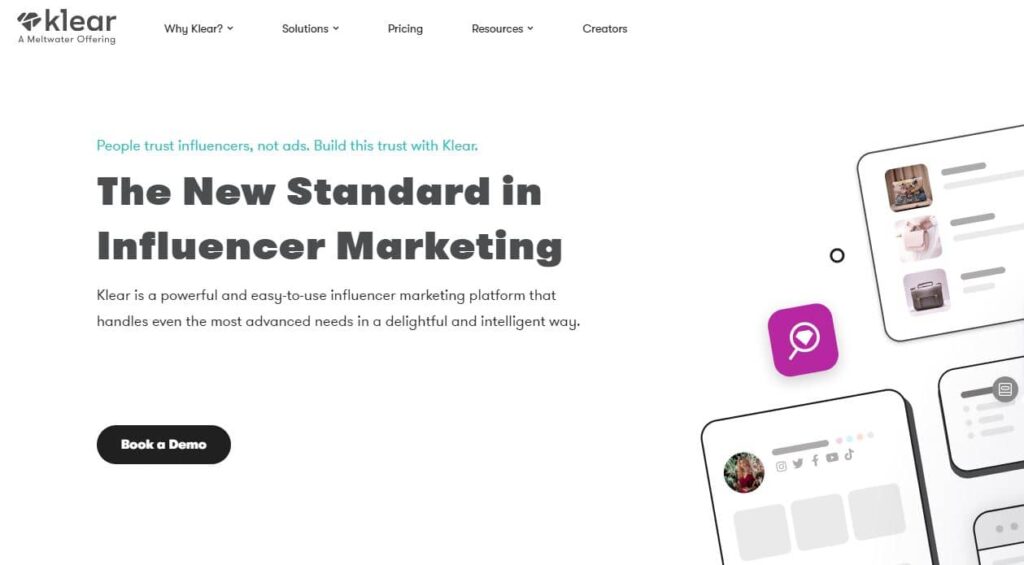
Klear is a powerful and easy-to-use influencer marketing platform that handles even the most advanced influencer marketing needs. You can find influencers to work with, manage the process of working with them and measure campaigns all in one place
PushEngage
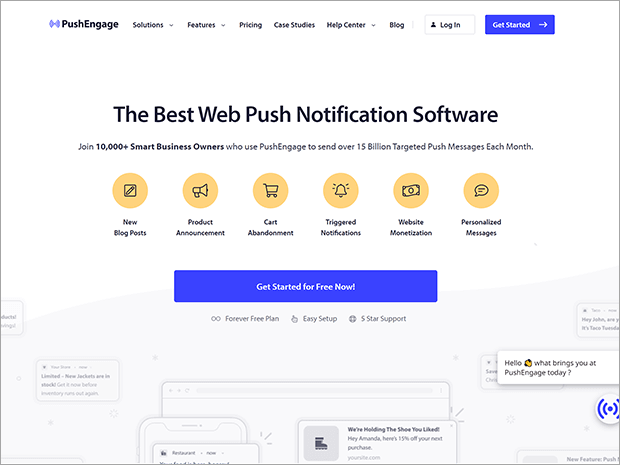
PushEngage is a push notification Shopify app you can use to send notifications to visitors to your site. They’re totally customized and let you recover abandoned carts, re-engage with users when they’re on the site, and ultimately drive more sales.
People are more likely to sign up for push notifications since they don’t have to share personal information, like an email or phone number, to opt-in. It installs in just one click and is super easy to use.
Yoast
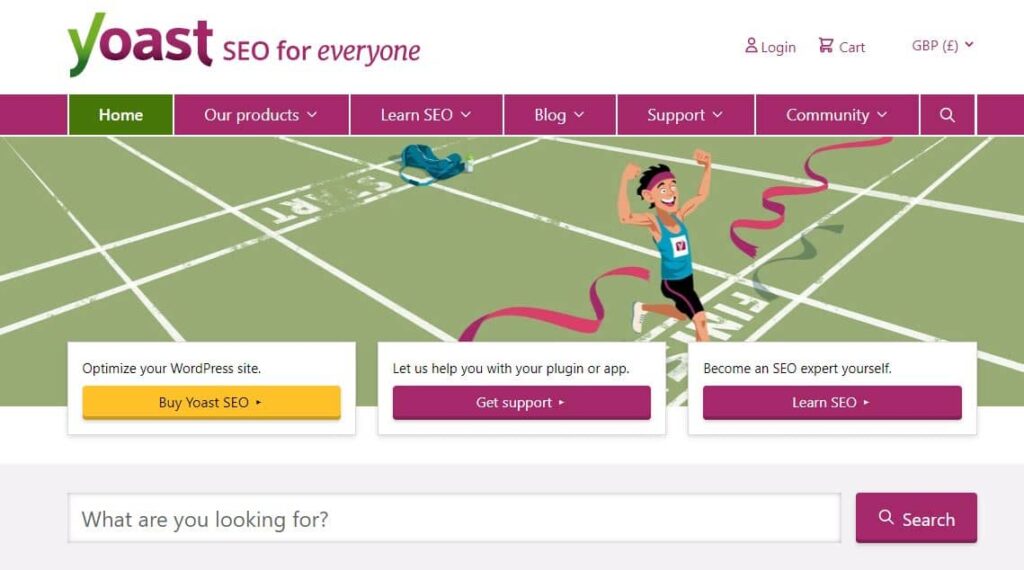
Search Engine Optimisation (SEO) is big news when it comes to increasing awareness of your website and sales platform. However, it can seem like a mystery if you’ve never done it before. That’s where apps like Yoast can seriously help you to create content that helps with SEO.
While it won’t replace a genuine, human expert or help you out if your website isn’t set up properly, it can act as a useful prompt to write product descriptions, pages, and blogs in a way that’s more likely to rank on search engines.
Octane AI
Looking to add a product quiz to your Shopify store to offer product recommendations, gamify your customer shopping experience and give the feel of a customized product? You need Octane AI. It’s a Shopify quiz app that lets you build a product quiz in minutes and gives you valuable data all about your potential customers.

Your quizzes ask customers one question at a time to pinpoint what they’re looking for. Then it automatically generates a list of personalized product recommendations, with add-cart links to improve average order value. The quiz data syncs with your email and SMS marketing apps.
Hubspot Blog Ideas Generator
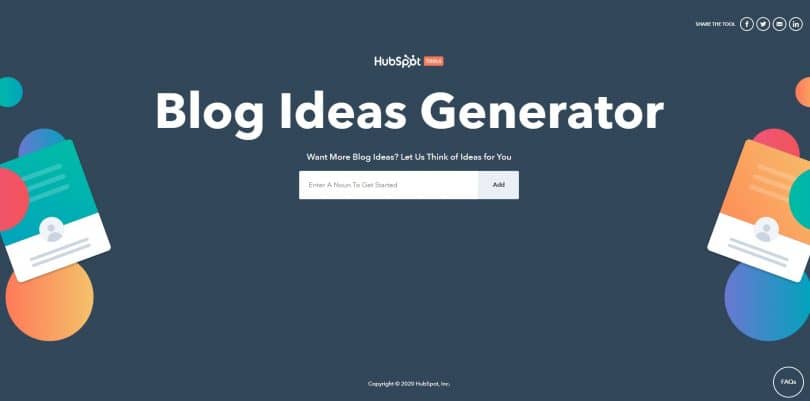
If you’re planning on using content marketing to help promote your website, but you’re struggling with blog ideas, try the Hubspot Blog Ideas Generator. Simply add a noun to the on-site search engine and you’ll be served with blog ideas that align with the topic you’re thinking of. This can be seriously useful when it comes to getting ideas for your content.
WhatsApp for Business
This can make customer service and communicating with your customers way easier as they’re already used to using Whatsapp. It provides the tools to automate, sort, and quickly respond to messages. It’s also intended to feel and work just like WhatsApp Messenger. You can use it to do everything that you’re used to doing, from messaging to sending photos – this makes it handy for customer complaints, asking questions, or requesting information about your business.








